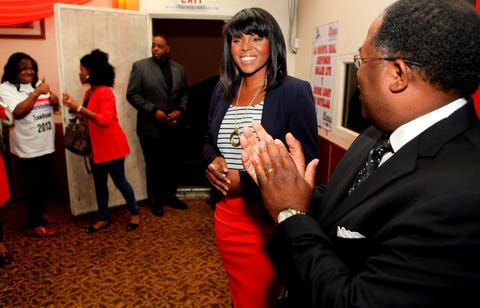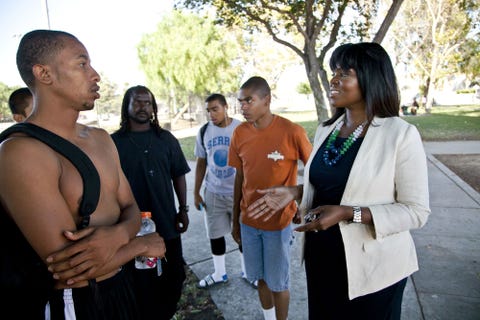The statistics aren’t good. According to recent estimates, women make up just under 20 percent of Congress and less than 25 percent of all state legislatures. Only six of our nation’s governors are women. But we are 51 percent of the population. And the research shows that when women participate in government, we make it run better, more collaboratively. Historically, women have needed to be convinced to enter politics. But within weeks of the 2016 presidential election, thousands of women announced they plan to run. And we want them to win. So we’re giving them a weekly example of a woman who has run and won. The point: You can, too.
Aja Brown was elected mayor of Compton, California, in 2013. She had to beat 12 candidates to win, including two of her predecessors. She was 31.
Brown, who attended the University of Southern California on a full scholarship, earned her degree in urban planning and development—an expertise that has served her well throughout her career. In 2009, she joined Compton’s Redevelopment Agency. Eventually, she created and oversaw Compton’s Apprentice Program, an initiative that hires residents to work on city-backed improvement projects. In 2011, Brown co-founded the Urban Vision Community Development Corporation to boost economic development in the city.
Twenty-five years ago, violence in Compton was at an all-time high. Under Mayor Brown’s leadership, it’s been reduced by almost 65 percent.
I was never focused on politics. For about 10 years, I was committed to working around politics, in urban planning and development. But a few years ago, I was working in one of our city agencies. I had to fully craft a new marketing strategy to support our economic development. We put together a whole initiative, and it really performed well, but I realized the biggest issue we had was still the stigma [around the city]. I looked at our current leadership, and I felt like if we didn’t have a drastic shift in the messaging about our city and if we didn’t start looking forward to our future, we would never be in positions to take advantage of opportunities that our residents deserve. I decided I could do this and I was willing to serve.
When I was a kid, I thought I would be an entrepreneur and maybe at some point go into law school. In middle school and high school, my mother put us in engineering exposure classes. I did engineering to make her happy and I was good at it, but when I was a freshman at USC, I realized I needed to take some time to think about it. What did I want to do? What concerned me? I never knew about urban planning, so I did some research and took some classes, and I just loved it. It was at the intersection of all the stuff I cared about: justice issues, access, equity, and then growing places and environment. And those interests have just continued to converge. All that’s still what I’m interested in!
I knew when I decided to run that the sacrifice would begin with my family, and my husband and brother were very supportive. My husband and I grew up in families that were close. We would see each other sometimes at weddings and family events, but we never went to the same school. We reconnected my senior year of high school and started dating. After two weeks of dating, my husband declared that I would be his wife. I thought he was insane. But he was right, and we’ve been together ever since. It’s been a great journey. He’s my best friend, and we’re just really teammates. I count on him a lot.
I’ve always understood that as a woman and as a person of color I would always have to work harder, I would have to have thicker skin, I would have to be more mindful of my reactions, the way I spoke to people. I was raised by a single mother, and I watched her deal with so much adversity at her job and in her workplace. I learned from her experience to never give up and to always stay focused. Because of her, I had the expectation and the belief that I was going to get through it, whatever the obstacle in my path was. And I’m grateful that she instilled that in me, because I think perception is so much more powerful than reality. A young person believes that they’re disadvantaged or that they’re behind the curve or that they’re “less than,” then they’re always going to feel that way and they’ll act that way. In Compton, that’s the biggest thing for us; we need to overcome our own perception, our own sense of the limitations on what we can and cannot do. People who come from Compton—they’re overcoming so many challenges that most people don’t have to overcome, but that creates special tenacity and different skills that you just can’t manufacture.
I have a lot of that in me. Because I was young or because I was female, people have thought that I wouldn’t be able to take the toughness of politics or the toughness of this or that job, and I’m still here. And so I look up to all the women who have done that, too. I still remember when Maxine Waters was elected the first African-American congresswoman. My mother sat me down and said, “See, she’s making history.” I like people who break the mold.
Right now, there’s a change in conversation happening about our city. We’re not doing what people necessarily expected. Our future is going to be much brighter now than people thought it would be in the past. We have a funded infrastructure plan for the city of Compton, not only for today but for generations. We’re going to be able to pay for new roads, parks, streetlights. We’ve had a surge in economic investment, from national stores moving into the city to small businesses launching here. And our city is safer; homicides are at a record low.
In a lot of communities, people are talking about policing and community relations. For us, we didn’t have the option or the resources to add additional law enforcement in our community, so we had to choose a different approach. We worked with community organizers, our local law enforcement, and former and current gang members to figure what we needed to have safer neighborhoods. We created programs for gang intervention. We launched specialized workshops geared towards that population. We continued with job placement, focusing on restoring people and giving them the chance to lead a better life with dignity. When most people feel like they’re being cared for and they’re part of society, times can change.
If you had ever told me that I would grow up and become an elected official, I would have said no. But I’ve stayed true to what I believe. I think too many people stay silent, and that’s why so much stays the same. I focus every day on what I can do to step forward, to step up, to lift up young people, especially young women. I have always believed women have so many natural leadership qualities. They just need opportunities and access. This is the generation that’ll make it happen.
Source: elle.com




